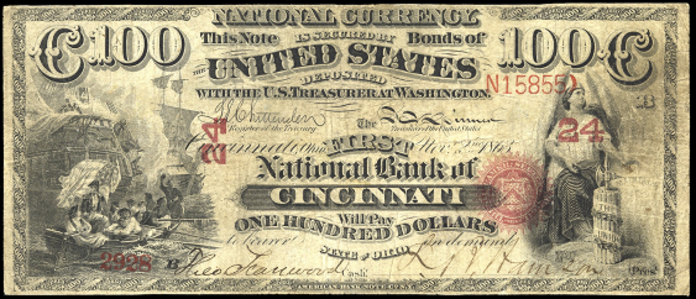One Hundred Dollar Notes › Nationals › 1863 One Hundred Dollar Original Series National Bank Notes › New Jersey Charters › 1863 $100 Phillipsburg New Jersey Phillipsburg National Bank
Get Value Now
| Item | Info |
|---|---|
| Series | 1863 |
| Charter | #1239 Phillipsburg National Bank of Phillipsburg, New Jersey |
| Year Chartered | 1865, 944 Banks Chartered |
| City Info | Phillipsburg is a town in Warren County, New Jersey, United States, a sister city to the cross-Delaware River industrial partner of Easton, Pennsylvania. The town is located along the Delaware River in western New Jersey, on the border with Pennsylvania, and is considered part of the Delaware Valley region and the eastern border of the Lehigh Valley region. The Norfolk Southern Railway's Lehigh Line, runs through Phillipsburg on its way cross river to Easton, Pennsylvania. The Belvidere Delaware Railroad was leased and later acquired by the Pennsylvania Railroad connecting the lower Poconos to Trenton, New Jersey and Philadelphia. Source: Wikipedia |
| Similar Cities | City name is unique, no others like it. |
| Seal Varieties | Red with rays |
| See Also | If your note doesn't match try: 1. 1863 $100 Compound Interest Treasury Note 2. 1864 $100 Compound Interest Treasury Note 3. 1863 $100 Gold Certificate 4. 1861 $100 Interest Bearing Note 5. 1863 $100 Interest Bearing Note 6. 1864 $100 Interest Bearing Note |
| Other Info | 1. Value depends on notes known for charter, condition and market demand. |
| Neat Fact | Check your note's serial number. Serial #1 notes are valuable, even on common charters. Serial numbers 2-4 are also desirable in some cases. |
No Obligations Offers and Appraisals
Please submit a good photo or scan. It will be identified and evaluated. Understand there may be subtle differences between the image you see above and your note. Signatures, design, markings and note condition will determine the offer price. Notes in Uncirculated or better condition receive the best offers.
Appraisals can be estimated for wholesale and retail prices. Wholesale is what dealers typically pay. Retail is what a collector might pay. Retail is slightly higher in most cases.
Please visit this page for USA Paper Money Reference. Do not treat this page as a reference guide, it is for appraisal and acquisition purposes only.
